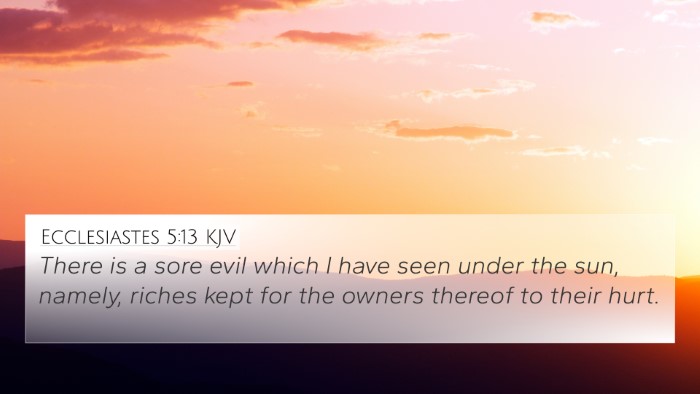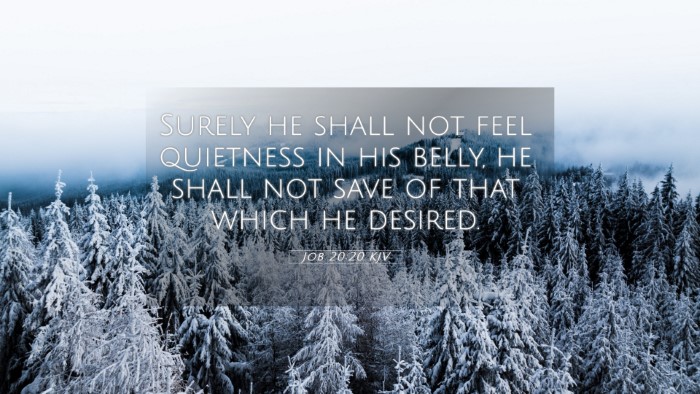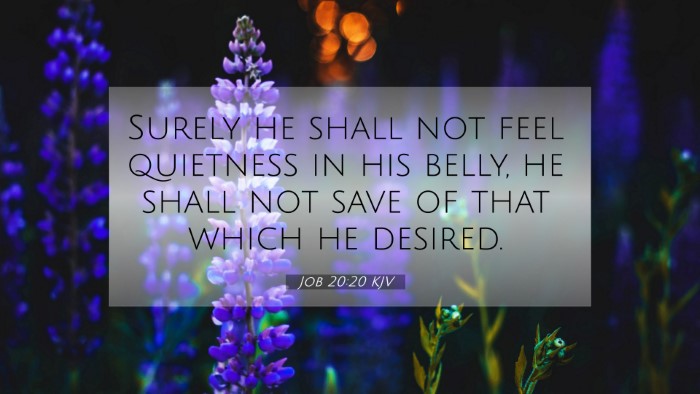Old Testament
Genesis Exodus Leviticus Numbers Deuteronomy Joshua Judges Ruth 1 Samuel 2 Samuel 1 Kings 2 Kings 1 Chronicles 2 Chronicles Ezra Nehemiah Esther Job Psalms Proverbs Ecclesiastes Song of Solomon Isaiah Jeremiah Lamentations Ezekiel Daniel Hosea Joel Amos Obadiah Jonah Micah Nahum Habakkuk Zephaniah Haggai Zechariah MalachiJob 20:20 Similar Verses
Job 20:20 Cross References
Surely he shall not feel quietness in his belly, he shall not save of that which he desired.
Uncover the Rich Themes and Topics of This Bible Verse
Listed below are the Bible themes associated with Job 20:20. We invite you to explore each theme to gain deeper insights into the Scriptures.
Job 20:20 Cross Reference Verses
This section features a detailed cross-reference designed to enrich your understanding of the Scriptures. Below, you will find carefully selected verses that echo the themes and teachings related to Job 20:20 KJV. Click on any image to explore detailed analyses of related Bible verses and uncover deeper theological insights.

Ecclesiastes 5:13 (KJV) »
There is a sore evil which I have seen under the sun, namely, riches kept for the owners thereof to their hurt.

Isaiah 57:20 (KJV) »
But the wicked are like the troubled sea, when it cannot rest, whose waters cast up mire and dirt.
Job 20:20 Verse Analysis and Similar Verses
Understanding Job 20:20
Job 20:20: “Therefore he shall not see prosperity;”
Overview
The verse Job 20:20 comes from the discourse of Zophar, one of Job's friends, who emphasizes the fate of the wicked. This verse reflects on the idea that those who live unrighteously will ultimately face destruction and fail to experience true prosperity.
Commentary Insights
-
Matthew Henry:
Henry expounds on the theme of inevitable consequence for wrongdoing. He highlights that prosperity, when it comes, is fleeting for the wicked and will not last, likening their fleeting joys to the “bread of deceit.” The point is that those who gain through deceit will find it leads to ruin.
-
Albert Barnes:
Barnes emphasizes the principle of divine justice that governs the world. He points out that the individual in question shall not find lasting happiness or ease, as the weight of their actions will pull them down. The prosperity that they may seem to have will vanish, leading to eventual turmoil.
-
Adam Clarke:
Clarke suggests that Zophar asserts a universal truth regarding the consequences of sin, portraying the internal conflict of the wicked. The implication is that no true wealth or peace can come to those who act against God’s commandments. Clarke notes that the rich gain through trickery do not possess their wealth peacefully.
Cross-References
Job 20:20 is interlinked with several Bible verses that highlight themes of prosperity, sin, and divine judgment. Some notable cross-references include:
- Psalm 37:1-2: "Fret not thyself because of evildoers, neither be thou envious against the workers of iniquity. For they shall soon be cut down like the grass, and wither as the green herb."
- Proverbs 10:3: "The LORD will not suffer the soul of the righteous to famish: but he casteth away the substance of the wicked."
- Proverbs 11:18: "The wicked worketh a deceitful work: but to him that soweth righteousness shall be a sure reward."
- Proverbs 13:22: "A good man leaveth an inheritance to his children's children: and the wealth of the sinner is laid up for the just."
- Isaiah 57:21: "There is no peace, saith my God, to the wicked."
- Galatians 5:19-21: "Now the works of the flesh are manifest, which are these; adultery, fornication, uncleanness, lasciviousness... and they which do such things shall not inherit the kingdom of God."
- Romans 2:6: "Who will render to every man according to his deeds."
Thematic Connections
This verse can be viewed through thematic lenses including:
- Divine Justice: The idea that God's justice prevails in all circumstances, ultimately rewarding the righteous while punishing the wicked.
- The Fleeting Nature of Wickedness: Emphasizing that the evil doer may seem to thrive temporally but will ultimately face judgment.
- Spiritual Poverty: Highlighting the notion that true wealth is spiritual, often contrasting the material wealth of the wicked with the spiritual inheritance of the righteous.
Related Studies
For those conducting a comparative Bible verse analysis or using tools for Bible cross-referencing, consider engaging with:
- How to find cross-references in the Bible: Utilizing tools like a Bible concordance or a cross-reference guide can enhance your study.
- Identifying connections between the Old and New Testament: Explore how themes established in Job are reinterpreted in the New Testament.
- Links between the Prophets and Apostolic teachings: Analyzing the continuity in messages across different Biblical figures.
Conclusion
Job 20:20 serves as a poignant reminder of the essential Biblical principle that the path of the wicked leads to demise, while the righteous can expect prosperity grounded in moral integrity. By examining this verse through the lenses of the insights from distinguished commentaries and inter-Biblical dialogues, believers gain a deeper understanding of God's justice and the transient nature of evil.


